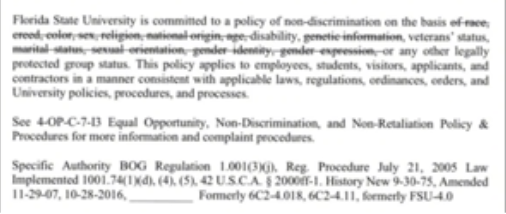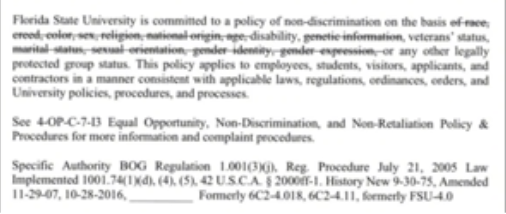“Every Instagram story was a PSA warning people where not to go because ICE was there,” an anonymous Senior Camper said while perched atop a couch inside of one of Danbee’s dance studios. The camper’s “almost entirely Hispanic neighborhood” is one of the many communities affected by Donald Trump’s polarizing policies. When Trump climbed back into presidency this January, he immediately began implementing his Project 2025-adjacent ultra-conservative agenda (Project 2025 is the Heritage Foundation-administered plan for Trump’s second term, largely postulated by a significant number of the president’s adjuncts). Many of Trump’s supporters often insinuate that the policies he has recently unfurled have little effect on the everyday person. Based on the multifaceted experiences of affected WriCampians and instructors, this is far from the case.
“Lots of my friends are first-gen with immigrant parents who voted for Trump because they believed that he would help the economy,” continued the same camper. “Now they seem a bit less supportive [of him].” Trump had promised to swiftly “make America affordable again,” but he subsequently facilitated the inflation and tariffs of food prices and foreign goods alike. As Trump’s tariffs sparked economic uncertainty, a diverse slew of Americans saw their personal sovereignty threatened.” My friend was a step away from self-deporting,” the camper added. “He and his family had been talking since 2016 about leaving the country for their safety.”
She went on to explain that the friend was a legal citizen through birthright citizenship, and his parents had been living in the United States for 30 years, lauding him as “one of the best people I know.” Trump recently issued a targeted executive order attempting to restrict birthright citizenship of those with immigrant parents, hinting at potential balkanization of state legislature. Although the aforementioned executive order failed to pass, Trump has recently deported and mistreated a young girl with brain cancer and continues to institute hostile rhetoric towards immigrants.
“They were hiding in their beds” and discussing a return to Mexico, the camper added. Her friend got to work booking the cheapest flights, to which he was only able to bring one carry on per person. “[My friend] wasn’t planning on going to school once they got there – he was planning to work,” she said, illustrating the jarring consequences of Trump’s rhetoric and policies.
Fortunately, once the word got out, their school was able to provide him with an attorney, and his departure is postponed at the time of writing (he was, however, brought to the airport by his friends, prepared to leave for Mexico.)
One of Writopia’s leaders who prefers to remain anonymous also has a loved one impacted by Trump’s aggressive agenda.
Amongst the convoluted values of Trump’s government policy, rigid framework has floated around multiple government spaces over the past months (ICE funding, for example, has increased and restrictions have loosened, while environmentalists and educational programs have faced extreme budget cuts). In one staffer’s words, his brother works on “stuff that I feel like anyone should agree on” – projects hallmarked by soil sciences, field growing, or agricultural endeavors. “To see him constantly not knowing whether he’ll have a job is stressful for him and his wife, who works for a nonprofit that had 75% of its budget wrapped up in federal grants. It’s awful,” he said. “They spent a decade of their lives building careers that they thought would be reliable in helping their country. Now they’re getting the rug pulled out from under them.”
Instructor Lil’s mother holds a senior position at The Securities and Exchange Commission and was forced to come back into the office five days a week. “They still need to send their ‘What Did I Accomplish This Week’ email which is something that he [Trump and “special government employee” Elon Musk] instituted and has not gone away,” they said. Although Musk’s recent absence in the government has been notable, many of his policies stay intact. Lil described “micromanaging” and “a culture that had shifted post-pandemic and is now being forced back,” underscoring the exploitative nature of the administration regarding citizens and in-house employees alike. Despite this micromanagement, the administration continues to sloppily handle their own government documents; once using AI in a report, and another time recently leaving documents in an Alaska hotel. Lil also hinted at more sensitive changes in internal government culture, adding that they are not able to be reported on in the WriCampian but are “no less onerous.”
While the proposed ICE funding alone featured in July’s Big, Beautiful Bill would exceed the military budgets of all but a few countries, Trump continues to leave an education-sized gap in federal funding. Kayden, a Writopia camp counselor who attends Florida State University, has noticed subtle but upsetting changes in her campus policies and culture. “They took out every discrimination clause for every protected class except for veterans and people with disabilities,” Kayden said of the status of her school’s handbook. This came in the midst of Trump’s onslaught on Diversity, Equity and Inclusion initiatives (designed to provide a level playing field for every American regardless of their economic status, sexuality, ethnicity, or another form of systematic oppression.)
“Nobody knew it was happening. The president of the Democratic Party Club at FSU made a TikTok video and that’s how people found out,” she said of the situation. The university had eliminated support staff despite a spike in “instances of students using racial slurs or slurs against gay people out loud.”
There was a self-proclaimed Nazi that the administration failed to reprimand. Despite ultra-conservatives’ recent strategy of weaponizing antisemitism to further their own agenda, neo-Nazis often have prominence and are even rewarded by those ideologically compatible with Trump (a Trump-appointed professor had recently rewarded a white supremacist essay at a closeby university, according to the New York Times.) Kayden’s family has also been directly impacted. Her aunt works for the FBI, but her career has been newly threatened. She was technically fired in the system but she still works there.” she said of her aunt’s employment status.
“My aunt recovers American citizens who have been trafficked and it’s really confidential,” she shared while sitting on the Welcome Center porch. But, she added, Trump’s administration frequently requests confidential documents. Of declining literacy rates and college admissions (Trump’s Big Beautiful Bill aims to decrease financial aid initiatives), Kayden said that it is becoming difficult for “Black and Brown people to find a way out.”

In another recount of Trump’s habits of suppressing educational pursuits, Lili S., a Senior Camper, described her parents’ workplace at Columbia University. Even pre-Trump, Columbia had its share of widely-known political controversies. The president of the college had previously shut off campus to pro-Palestinian activists but let in a leader of the Proud Boys, a white supremacist group. “Columbia was sort of plunged back into chaos when Trump took office,” Lili said. She described her mom sitting on the couch and crying due to her grants being taken away. The uncertainty of the funding of these grants (which would have supported genetic research and education), coupled with opposition to pro-Palestinian activism got “very muddled with his opposition with the academic elite.” In order to keep their funding, Lili’s parents sifted through grants and eliminated words such as “genetic diversity” in fear of a government-controlled AI flagging the studies for words on the NSF (National Science Foundation) banned words list.
The dystopian practice was both startling and under-planned. “There are math words like bias and inequality and they don’t realize these are in every study.” Between stifling study funding and installing “a bunch of far-right pro-Israel professors,” Trump’s administration has a habit of tangling the truth when it comes to both science and geopolitical tensions in the Middle East. Trump has largely facilitated an ideological division within the United States, and Lili says that he has instituted a similar division at Columbia: many professors leaned towards succumbing towards Trump’s policies for fear of losing funding, while others – such as Lili’s parents – expressed no desire to implement a deal with Trump.
Like most Americans, many campers also have personal connections to foreign countries, whether they have heritage there, lived there, or are acquainted with someone who has a connection to the country. Jackson, 13, reported knowing someone who lived in China for a short period of time and considered leaving the country. Finn S., 12, had a cousin from China who was previously an international student. He reported that Trump’s hostile tariffs and rocky relationship with the Chinese government and its citizens was worrisome (although Trump’s Chinese policy is highly conditional and makes little economic sense). Matt, 11, reported that his parents are from England and that his parents are trying to get him and his sister passports to “the country I’m originally from” as his dad applied for citizenship (he currently holds a green card). As Trump remains isolationist towards many countries, WriCampians fear for the well-being of the permeated international community that the United States holds.
The nationalist aggression was met with confusion and anger by an anonymous upper camper who discussed her emotions on the bench in the back of the art center. The camper, who was born in the United States and grew up in “quite a progressive city,” moved to a different country as a pre-teen. As a queer young American residing abroad, she often sees her American friends “fearing for their safety” when she returns to American land. Despite Trump attempting to remove “bias” from Columbia studies, this camper has noticed a lot of it within her parents’ experience working for the government. “I love where I grew up and it holds so many memories but I have to come to terms with the fact that one day I might have to admit to myself ‘I can’t be here.’”
This attitude of pessimism proved to be rampant among campers. Lili often forces herself to be optimistic to get through the day and cites often feeling “weighed down.” Both Lili and Peter express optimism when it comes to New York City democratic primary mayoral elect Zohran Mamdani. If elected, Mamdani will be the city’s – among the country’s most prominent economically and culturally – first Muslim mayor. Defined by strong democratic socialist stances and anti-zionist activism, the candidate has appealed to many looking for a rescue from Trump’s depressing and undemocratic politics. “Zohran is actually speaking to the wealth issue and that’s not something the [establishment] democratic party wants to touch,” Peter said. He says that modern corporations have “little spine” and chase money when it comes to politics. As many speak of their discouraging anecdotes with the current administration, Lili, Peter, and other enthusiastic campers hope for a disruption in the status quo. Although a beacon of hope may be on the horizon, Trump has expressed a desire to take governmental control of progressive patches of the country – including the New York mayoral election – leaving strong signs that WriCampians’ glimmers of hope may wane. ✎






